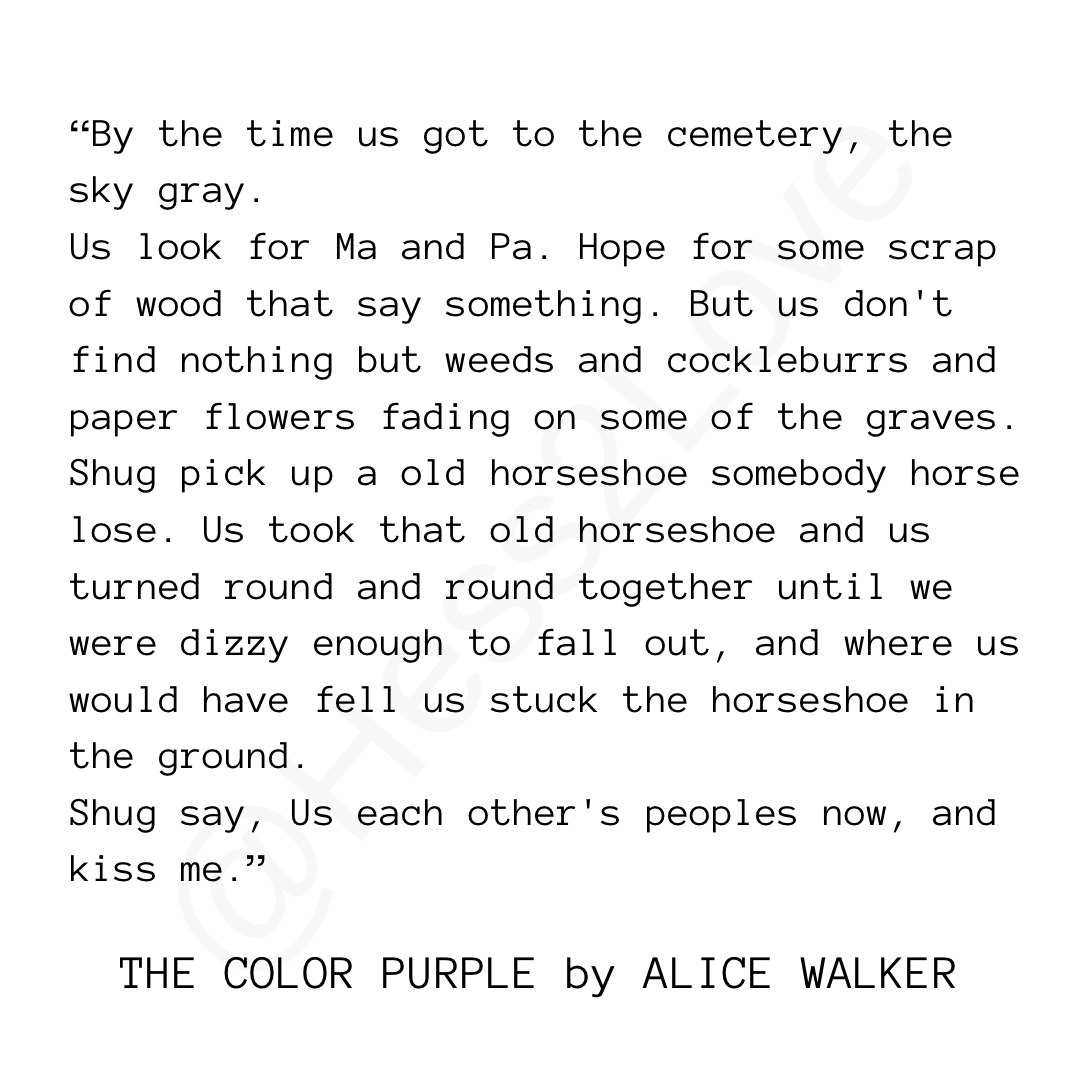The Hoodoo Inside: The Color Purple











Note: If you are reading this on your phone, tap on the image above to scroll through and read the examples of Hoodoo in the text before reading the rest of the blog.
I call The Color Purple by Alice Walker a book (we’re talking about the novel) that holds two religions, one being Black Christianity and the other being Hoodoo. There’s not much syncretism between the two that lives in the book as, both religions are present, whole, curtained from each other, and complete in their respects throughout.
The moments I love most are when Shug & Celie, then Nettie & Samuel would talk about God in their private conversations - each pair being across the ocean from the other. And how God shows up in the natural world. To me, that is the most Hoodoo part of the book - de-personifying god and locating where it is (at least on this planet).
The dictionary says that “personification” is “the attribution of a personal nature or human characteristics to something nonhuman, or the representation of an abstract quality in human form.”
The dictionary also says that the antonym or opposite of personification is “inexistence, nonbeing, nonexistent, nothingness, unreality, nonreligious person.”
Isn’t that something? The English language says that if it ain’t human, it ain’t nothing. Damn.
The English language also says the opposite of personification is a “nonreligious person.” Damn, again.
This colonial project has a lot to say about what is human, what is god, and what ain’t either.
From the 1985 film adaptation of Alice Walker’s “The Color Purple.”
Shug say, “Just because I don't harass it like some peoples us know don't mean I ain't got religion.” and “it come to me: that feeling of being part of everything, not separate at all. I knew that if I cut a tree, my arm would bleed.”
Shug’s approach to god is that of a woman that abandoned the garden and ran back into the wilderness. She knew that every story of a man abandoning the forest to become human is an attempt to separate himself from the wild that he is.
If I were a teacher, I’d say, “Let’s us” read Sylvia Wynter's “Unsettling the Coloniality of Being/Power/Truth/Freedom: Towards the Human, After Man, Its Overrepresentation--An Argument,” and sit outside to discuss it cuz you gon need to touch a tree to help get your mind through that. Wynter got some words on her, and every one of those words are needed to talk about whatever this (imagine me gesturing, widely) is.
While we’re next those trees i’d ask what is “the space of otherness?” as Wynter explores it, and do Celie and Shug dwell within it, or crawl out of it’s grip?
What is the definition of religion?, I’d ask. And who set it up like that? Religion, as colonialism has set it up, has been used in opposition to something, to create a righteous and an “other,” a worthy and a damned.
Celie othered herself after being damned for so long. Could we say that once Celie picked up her power, that she became a conjure woman?
A conjure woman is in the business of herself and everything it takes to exist, including making an equitable living with everything around her. Being in search of oneself is a religion, ain’t it? Locating oneself within the impossibility of everything. It damn sure is hard, soul-trying work.
Where does the Conjure Woman exist on the colonial binary of human and non-human, god…and not?
Again, if I were a teacher, I’d say, “After we read some Wynter, let’s give our eyes and brains some time to untangle and read Alice Walker’s 1975 article “In Search Of Zora Neale Hurston,” published in Ms. Magazine.
How did Walker’s experience looking for Hurston’s grave parallel Celie’s experience looking for her parent’s grave?
And, if you read Mules and Men by Hurston (like you were supposed to), which part of Hurston’s experience as a Hoodoo apprentice might Walker have used to inform conduit Celie’s curse on Mr. ______ (Albert)?
With The Color Purple, Walker wants us to consider what we make of god.
What do you make of god?
Featured Texts:
The Color Purple by Alice Walker (novel)
Unsettling the Coloniality of Being/Power/Truth/Freedom: Towards the Human, After Man, Its Overrepresentation—An Argument by Sylvia Wynter (essay)
In Search of Zora Neale Hurston by Alice Walker (article)
Mules and Men by Zora Neale Hurston (novel)
I don’t cover everything in these “The Hoodoo Inside” posts. That would take the fun out of it for me, as well as take away the opportunity for you to find the rest.
Is there a book you’d like me to read and find the “hoodoo inside” of? Let me know; I do take suggestions.


